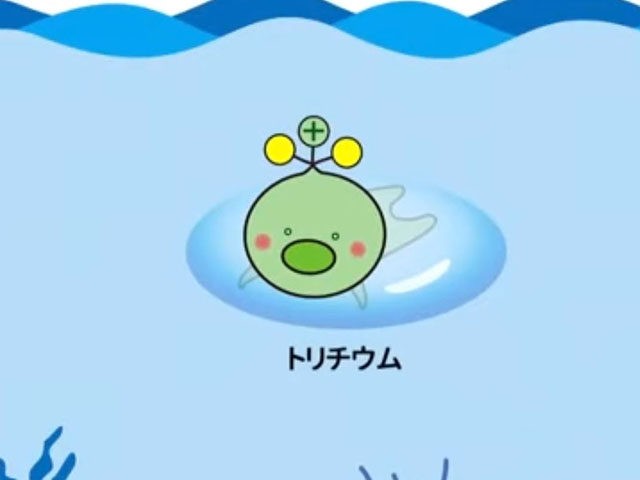A senior government official in Japan apologized Tuesday, dramatically bowing to the public before a television camera, for the creation of a “mascot” meant to endear the public to tritium, a radioactive waste product.
Japan has been dealing with an abundance of tritium, a radioactive isotope of hydrogen, for over a decade following the 2011 earthquake and subsequent tsunami that destroyed the Fukushima Daiichi Nuclear Power Plant. Japanese officials used over 1 million tons of water to cool the melting reactor cores of the plant, a process that, due to hydrogen’s presence in water, created significant amounts of tritium.
Japan approved a plan last week to release the water from the plant into the Pacific Ocean, insisting Tokyo would “treat” the water first and no tritium would be released in at least two years due to the time-consuming nature of processing the material. The cleaning treatment would notably not remove tritium from the water supply. Nearly every neighboring country issued vocal protests at the plan, most prominently China and South Korea. The administration of President Joe Biden issued a statement thanking Japan for the “transparent plan.”
In an attempt to foster public support domestically for releasing the water, Japanese officials debuted “Little Mr. Tritium,” a “cuddly” cartoon mascot who insisted he was nothing to fear.
Tritium is a common waste product even at functional nuclear plants and the subject of much speculation regarding health risks to humans.
“People are exposed to small amounts of tritium every day, since it is widely dispersed in the environment and in the food chain,” the U.S. Environmental Protection Agency (EPA) states on its website. Yet Scientific American noted in an article that some evidence suggests tritium is a potent carcinogen, particularly dangerous because it can spread rapidly in the human body through water.
The Japanese government canceled its rollout of “Little Mr. Tritium” a day after his debut. On Tuesday, Japanese Reconstruction Minister Hirasawa Katsuei issued a televised apology to horrified Japanese citizens, particularly Fukushima residents who have suffered the most from the plant’s meltdown. Hirasawa, who is in charge of the handling of the clean-up of the Fukushima site, noted that his office had been flooded with angry phone calls and written comments from people who considered the mascot offensive to those harmed by the tremendous amount of radiation released by the Fukushima disaster.
Hirasawa bowed to the public, stating he “sincerely apologized” for the offense to the feelings of the people of Fukushima.
Japanese officials had previously defended the animated character as a way to attract attention to an important issue. “Nuclear power plants are highly specialized and difficult to understand. We want many people to take an interest in them,” an official said last week, according to Japan’s Kyodo News.
Hirasawa announced that a “modified” version of the character would soon debut that would take into consideration the concerns of the public. He also insisted no errors in the factual explanation of what Japan would soon do with Fukushima’s tritium existed in the video in which “Little Mr. Tritium” appeared.
Kyodo News noted that Fukushima fishermen have been particularly vocal in opposing the plan to dump the tritium into the Pacific Ocean. While Japanese officials have attempted to address concerns regarding the danger the isotope poses to humans, the anglers fear the tritium will kill the fish supply in the region.
The head of the Federation of Japan Fisheries Cooperatives released a statement last week calling the decision to dump the water ” extremely regrettable” and demanded the government explain the decision, noting that Tokyo had previously reconsidered the possibility of releasing the radioactive contents of the plant.
“The government reversed its earlier position that it would not go ahead with the water disposal without gaining an understanding from concerned parties,” the statement read, according to Japan’s Asahi Shimbun. “The decision tramples on the feelings of fishermen not only in Fukushima Prefecture but also in the rest of Japan.”
Responses to the plan from Japan’s neighbors have been overwhelmingly negative. The government of South Korean President Moon Jae-in threatened to sue Japan at an international court if any of the tritium made it into the Pacific Ocean.
“In an internal meeting, Moon ordered his government to ‘proactively consider’ bringing the matter to the International Tribunal for the Law of the Sea,” presidential spokesman Kang Min-seok said last week. “The [South Korean] office of the secretary for legal affairs has begun a review of various options, which include a formal request for the tribunal to take a provisional measure first, similar to a ‘court injunction,’ against Japan’s move.”
The Chinese Communist Party also objected upon the announcement of the release of the water and has continued to do so through its Foreign Ministry on a near-daily basis.
“The discharge of sewage from a normal operating nuclear power plant complies with internationally accepted standards, whereas the Fukushima nuclear water contains a large amount of radionuclide used to cool off the nuclear reactor after the Fukushima accident,” Foreign Ministry spokesman Wang Wenbin said Monday, “which will have a huge impact on the global marine environment.”
Another spokesman, Zhao Lijian, urged Japanese politicians to drink and cook with the tritiated water to prove it is safe to disperse into the ocean.

COMMENTS
Please let us know if you're having issues with commenting.